- Home
- Molly Harper
Sweet Tea and Sympathy Page 8
Sweet Tea and Sympathy Read online
Page 8
“What?” he panted against her neck.
“I’m sorry,” she whispered, dialing in her access code.
Frankly, she was sort of amazed she was getting enough reception to receive a text, but there it was, a message from Marianne blinking on her screen. M, are you OK? Couldn’t find you in the ladies room.
Marianne and Frankie. She’d just left them in the bar. She’d been gone for at least fifteen minutes. Guilt splashed through her middle like rainwater from a bucket. She’d abandoned her cousins to make out with a strange man, like some teenager at a kegger. She sat back and took in the kiss-drunk face of a stranger, pupils blown, an impressive erection tenting his jeans as he stared up at her, caressing her neck.
Disgraceful.
She shivered as her mother’s disapproving voice echoed in her head. And Mother was especially disapproving at the moment. Margot’s stomach dropped. What the hell was she doing? She didn’t even know this guy. She didn’t know his name. What if he was some sort of psycho? What if he knew her family? What if he was her family? For all she knew, they were cousins.
“Ohmygod,” she whispered, climbing out of his lap.
“What, are you okay?” He sat up suddenly, his expression alarmed.
“I’m so sorry.” She reached for the door handle, throwing her weight against the door.
“Are you going to be sick?”
“No, no, I’m just—I’m so sorry.”
Margot opened the truck door, suddenly very sober, and booked it across the gravel without looking back. The muggy Georgia air seemed to leave a clammy sheen on her skin, making her rub her hands over her upper arms. She walked into the front entrance of the Dirty Deer and found her cousins there, talking to the manager with concerned expressions on their faces.
“Honey, where were you?” Marianne cried, throwing her arms around Margot’s neck.
“I just stepped outside for some air. The liquor got to me a little quicker than I expected. But I think I’m ready to go. Don’t you think we should go? Yeah, let’s go. Now. Please.”
Frankie lifted a dark brow, skimming her eyes over hair Margot knew was disheveled and a dress that seemed to be sticking to her sweaty thighs. But much to Margot’s eternal gratitude, her cousin said nothing.
“That’s okay, just don’t go wandering off again. Uncle Stan would kill us if we lost you,” Marianne said.
Margot tried not to snort. “Did I ruin the evening?”
“No, it’s all right. Aunt Donna is our designated driver and she’s supposed to pick us up in a few minutes anyway. Be warned, when you’re drunk, she thinks it’s hilarious to speed up over the sharp drops so it feels like you’re on a roller coaster.”
Marianne nodded. “It’s her way of making us pay the piper.”
“No chance of Uncle Bob picking us up?”
“No, my dad also wants us to pay the piper.” Frankie snorted. “He recognizes that I’m physically an adult, but still feels the need to parent me in a passive-aggressive fashion.”
“Well, that’s kind of sweet,” Margot said, glancing over her shoulder at the door, praying that her brooding lumberjack wouldn’t storm through it and demand answers.
“You say that because you haven’t ridden with Aunt Donna yet.”
MARGOT SAT SLUMPED against the outside wall of her cabin, letting the heat absorbed into the porch soak through her suit jacket and soothe her aching . . . everything. The price for this comfort was exposure to the evil sun, but she fought the unwelcome blast of light to her corneas with huge Jackie O sunglasses. She was just grateful that the possum eggs stayed down.
She hadn’t been this hungover—ever—and vowed she would never touch moonshine again as long as she lived. She was actually looking forward to a big mug of Aunt Leslie’s chewy coffee. Despite her drunkenness, the physical exhaustion of white-knuckling through her aunt Donna’s driving, and the emotional exhaustion from fighting off post-truck-make-out regret and mortification, she’d had trouble falling asleep. She’d tossed and turned in her narrow bed, kept awake by the sound of rocks being banged together. She’d gone to her window, searching her yard for drunken cousins or bearded locals who might think this was a funny prank, but she couldn’t see anything but trees.
She’d finally drifted off around three and woken up to a text from Frankie, promising to pick her up for work. But instead of the tires-over-gravel crunch she expected, her ears were assaulted by the baying of Tootie’s pack of hounds. Margot winced and slumped forward, clapping her hands over her ears.
“Rough night, huh, honey?” Tootie called as the dogs clamored around her legs, sniffing and licking despite Margot’s feeble attempts to bat them away. “I told Frankie to take it easy on you. The first time you tangle with moonshine is like dancin’ with a good-looking carnie. Sure, it feels great at first, but you wake up sore and soaked in regret.”
Margot blanched. Aunt Tootie shooed the dogs away and pressed a Tupperware container—the vintage turquoise brand—and a travel mug into her hands. She poked her head through Margot’s unlocked cabin door.
“Aw, it looks like you’re gettin’ comfortable. That little bird you hung up looks so nice! And the candles. I’m so glad you’re settlin’ in.”
“It’s just a piece of window art; it’s not like I’m signing a five-year lease,” Margot grumbled, opening the Tupperware. Inside, wrapped in wax paper, was a flaky golden biscuit the size of her fist, soaked in melted butter, with thick slabs of bacon, scrambled eggs, and melted Velveeta oozing out the sides. She quickly snapped the lid back on the container, breathing through her mouth to avoid the smell of food. “What the . . . ?”
“Best cure for hangover is a big greasy breakfast,” Tootie told her. “The bacon fights off the booze.”
“Is there any food available in this town that isn’t soaked in pork fat?”
“Nope,” Tootie said, shaking her snowy head. “It’s in the bylaws. If we’re not feedin’ someone pork products, we get all twitchy and just start throwin’ biscuits at innocent bystanders.”
“Is it in the same bylaws that command you all to carry Tupperware with you at all times?”
“What do y’all carry your food in up north? Your bare hands?”
A little beagle mix trotted up to Margot and balanced his chin on her knee. He whimpered and eyed her sandwich with his hopeful doggy eyes. “I will not share,” she told him.
More whimpering. The big brown eyes seemed to get even bigger.
“Fine,” she huffed, opening the container again and breaking off a little piece of biscuit. He snapped it from her fingers and gobbled it down.
Margot sniffed at the travel mug and blanched. Was that oranges and . . . garlic?
Tootie hooted. “And that’s my special secret cure.”
“What’s in it?”
“You don’t want to know,” Tootie told her. “Just down most of it in the first gulp or you’ll lose your nerve.”
Margot grimaced but gamely pinched her nose shut and downed most of the mug in one long gulp. “That’s not so bad,” she said, smacking her lips against the flavor of citrus. It tasted like a Flintstones vitamin with a chunk of habanero-flavored tuna for flavor.
“Wait for it,” Tootie said. Margot recoiled at a combination of fish and fiery spice battling it out on her tongue. “There you go.”
“Why are all the beverages here trying to kill me?” Margot spat, wiping her tongue with one of the many napkins Tootie had supplied with the biscuit. “Sorry, I’m usually more of a morning person. I didn’t get much sleep last night.”
“Really? When I drink my own weight in moonshine, I usually conk right out.”
“No, I couldn’t sleep because some animal was building a nest out of rocks or something right outside my window. I heard this weird clacking noise all night, which made sleep difficult, even with the moonshine,” she said.
Tootie waved her hand dismissively. “Oh, that’s just the Sasquatch.”
Margot laughed,
but Tootie’s expression remained completely serious. “Oh, come on.”
“No, really, the Sasquatch have lived in these woods since before we even dreamed of climbing the mountains. They’re harmless, really, as long as you stay out of their way. They just like to bang the rocks together to remind us that they’re out there.”
“So, you’re telling me that Sasquatch is loitering behind my house, clapping rocks together?”
Tootie nodded. “That’s why we told you to stay inside at night. Sasquatch don’t appreciate it when you try to spy on them. There’s a reason no one’s ever seen one.”
“No one has ever seen one because they don’t exist.”
“You tell that to the cryptid-hunting teams that come through town trying to spot one. It’s been the one area of tourism that’s expanded for us over the last few years. We’ve been featured in three of those cable shows.”
“I would argue with you, but I’m just too damn weak,” Margot said.
Donna’s big red truck roared around the corner and skidded to a stop in front of Margot’s cabin, riling up all the dogs. The barking alone was enough to make Margot want to knock herself unconscious with a moonshine jug. Donna, the roller-coaster driver with the long, angular face and messy auburn curls, rolled down her passenger window and yelled, “How ya doin’ there, Big City?” over the loud purr of her engine.
“I’m fine,” Margot insisted, waving at her. Donna had hit every bump in the road between the bar and the McCready compound the night before. She’d stopped short. Hell, at one point, she’d turned a corner so hard all three of her passengers’ heads whacked together. “Just recovering from a driving-related concussion.”
“I’ll bet.” Donna snorted. “Next time don’t wake me up to come get your drunk asses in the middle of the night and maybe I’ll give you the kid glove treatment.”
“Frankie said you told her to call you!” Margot exclaimed.
“Doesn’t mean I have to be nice about it!” Donna called, gunning her engine and waving before speeding off.
“She’s just delightful,” Margot muttered, peering into the Tupperware once more. Though the smell of bacon and cheese still made her stomach roll, she took a big bite and forced herself to chew. She groaned, letting the combination of comfort flavors coat her tongue. Her diet had been completely wrecked by her move to Georgia. She was going to have to rein in her carb consumption or she wasn’t going to be able to zip her pants.
Still, it might be worth it.
“Don’t mind Donna,” Tootie told her. “She’s been a little . . . prickly since her husband died.”
Margot thought Donna was more aggressive than prickly, but she figured that note wouldn’t be well received. The beagle made a huffing noise and tried to nose at her container again. She rolled her eyes and broke off some of the bacon. He snapped it out of her fingers before she could even offer it, making her wipe her hands on another napkin. The dog put his paws on her legs, sniffing and attempting to lick at her hands. “No. That’s all you get. Don’t be greedy. This doesn’t make us friends.”
The dog grumbled and put his chin back on her knee.
“I don’t recognize him from the great closet raid,” Margot said, giving him an arch look.
“No, this here’s a new addition,” Tootie said, leaning down and scratching under the dog’s chin. “I’m calling him Arlo. Found him rollin’ around in the mud at the Food Carnival parking lot. But he cleaned up nice.”
Margot thought Arlo’s face, framed by the new blue collar Tootie had given him, was perfectly sweet. But she had no desire to form an attachment to a creature who could endanger her shoes. She loved her shoes.
“Go on,” Margot told him. “I’ve got to go to work. And I don’t need to do that with dog hair all over my pants. So . . . shoo.”
Arlo grumbled again, but Margot would not be moved. “Shoo.”
Arlo huffed and sat back but didn’t move away.
“Oh, no, you gave Arlo food,” Tootie said. “You’re his buddy for life.”
“Just what I always wanted,” Margot muttered.
“Come on, hon. I told Frankie I’d drive you into work,” Tootie said. “Eventually we’ll get you your own car so you don’t have to depend on us for transportation.”
“I don’t think that will be necessary,” Margot said, opening the passenger door of Tootie’s impeccably clean early-model Cadillac. “I won’t be here long enough to need my own car.”
Tootie made a little noise of disapproval before settling in behind the wheel and starting the engine.
“Y’all get goin’ now,” she called to the dogs. “Go on home!”
Though the pack dispersed, Arlo remained on Margot’s porch, his little dog chin resting on his forelegs. Margot would have to deal with that later.
Tootie was oddly quiet on the drive to the funeral home. Margot wondered if she should stop referring to her eventual departure from Lake Sackett. She’d thought she was doing her family a favor, keeping them from having false hope that she would stay. She would have appreciated someone squashing her false hope when she was a child. But she could see that she was only upsetting Tootie.
When Tootie turned the car into the McCready’s parking lot, a van labeled BONNIE’S BLOSSOMS was parked next to the building and Margot watched as someone carried a huge princess phone composed entirely of bright pink carnations toward the back door. The phone was wound with a white sateen ribbon reading JESUS CALLED HER HOME in magenta script.
“That’ll be the floral centerpiece for Elsie Mayhew’s visitation. Bless her heart.”
“I have so many questions,” Margot marveled.
“Oh, yes, the Heavenly Connection is very popular among the older ladies,” Tootie told her. “The brighter the carnations, the better.”
Margot shuddered. “I had an easier time believing in Sasquatch.”
She balled up her napkin. “Thanks for the disgusting curative smoothie and the pork products, Tootie. I feel almost ready to face my day.”
“Aw, that’s no problem, hon.” Tootie patted Margot’s arm. “Now, I don’t judge someone tyin’ it on every once in a while, and I’m glad you’re gettin’ to know your cousins, but it’s best not to make a habit of this. That’s not why you’re down here.”
The note of unease in Tootie’s normally cheerful voice, underscored by the tiniest hint of judgment, made Margot’s stomach turn. And between the hangover and the sunlight and the tang of oranges and tuna lingering at the back of her palate, the tight lid she normally kept on her emotions had loosened just enough. “So are you going to give Marianne and Frankie the same hand-pat and mini lecture, or is this just because I’m Stan’s daughter?”
Tootie’s eyes went wide. “What do you mean by that?”
“I can assure you that I have never had a drinking problem. Last night was an anomaly. I joined in what I thought would be bonding activity with the cousins you want me to get to know so badly.”
“I’m not sayin’ that, Margot. I would never throw Stan’s problem in your face like that. I’m just sayin’ that spendin’ time with your cousins is well and good, but goin’ out drinkin’ is not exactly how I hoped you’d spend your time with the family.”
“I’ve barely had any time to spend with any of you,” she said.
“Yes, that’s what I’m sayin’,” Tootie said. “I was hopin’ that when I moved you here, you would make more of an effort to get to know your daddy, but you’ve barely spoken to him.”
“And I hoped that when you contacted me, it was to help me. But you seem to have some very definite ideas about why you did and didn’t bring me down here.” Before Tootie could reply, Margot climbed out of the car with more speed than she thought possible, given the condition of her head. She slammed the car door behind her and instantly regretted it, not just for the noise but also the insult to Tootie.
Margot’s position here was precarious, she knew that. And she’d just antagonized the matriarch of the family. If
she wasn’t careful, she would be booted out of her last resort before she’d had a chance to rebuild her life into something acceptable.
She opened the funeral home’s office door and was confronted by the walls lined with paint-by-numbers Jesusi.
This was not going to be a good day.
MARGOT ROLLED HER shoulders, dislodging the sleeveless silk shell where dried sweat had adhered it to her skin. Though she’d ruthlessly rehydrated herself with bottled water, she felt like the walking dead . . . which was an uncomfortable position, considering her current location.
Between Frankie’s wincing at every sound and Margot’s snippy mood, Uncle Bob figured neither of them was fit for public interaction. He kept Margot busy with paperwork in the office all morning. Today’s Sisyphean task included learning the antiquated accepted style for newspaper obituaries. Apparently people took it very seriously if their step-grandmother’s cousin’s second wife’s uncle wasn’t included in their loved one’s death notice. But at least she hadn’t been saddled with some of the more bitter “Ding Dong, the Witch Is Dead” obituaries she’d come across in her research. People really enjoyed getting the last word in family arguments.
Margot had proposed an alternative that morning, showing Bob the program that would allow her to establish an online memorial wall for the funeral home, but Bob had rejected her idea before she’d even finished showing him the features.
“People around here don’t want their business put online, hon,” he’d told her.
“But they’re fine with airing all of their dirty laundry in the local rag?” Margot asked, lifting a copy of the Ledger. “And as a follow-up question, do people in this town still read newspapers?”
“I know it doesn’t make any sense, but it’s just different,” Bob said. “There’s a real distrust of technology around here. Hank Mason hooked his son’s iPod into the church’s PA system to play a hymn he found on the Internet and one of the seniors smashed the ‘devil’s rectangle’ with her shoe. It’s your second day on the job, sweetie, just slow down. Learn the ropes. And then you can make some changes. Why don’t you just focus on learning to write the obits?”

 Better Homes and Hauntings
Better Homes and Hauntings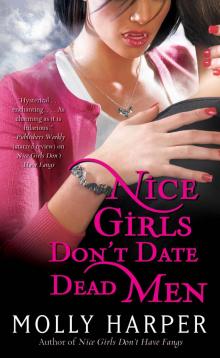 Nice Girls Dont Date Dead Men
Nice Girls Dont Date Dead Men The Care and Feeding of Stray Vampires
The Care and Feeding of Stray Vampires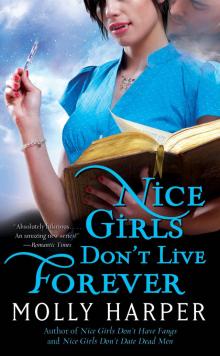 Nice Girls Dont Live Forever
Nice Girls Dont Live Forever The Single Undead Moms Club
The Single Undead Moms Club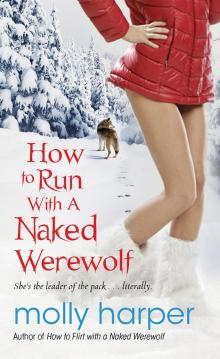 How to Run with a Naked Werewolf
How to Run with a Naked Werewolf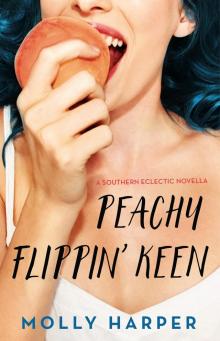 Peachy Flippin' Keen
Peachy Flippin' Keen A Witchs Handbook of Kisses and Curses
A Witchs Handbook of Kisses and Curses Ain't She a Peach?
Ain't She a Peach?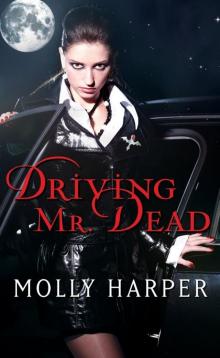 Driving Mr. Dead
Driving Mr. Dead Big Vamp on Campus
Big Vamp on Campus Where the Wild Things Bite
Where the Wild Things Bite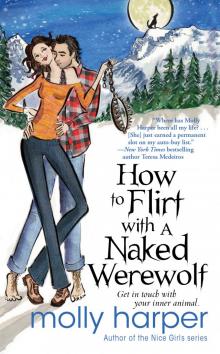 How to Flirt with a Naked Werewolf
How to Flirt with a Naked Werewolf Nice Girls Don’t Sign a Lease Without a Wedding Ring
Nice Girls Don’t Sign a Lease Without a Wedding Ring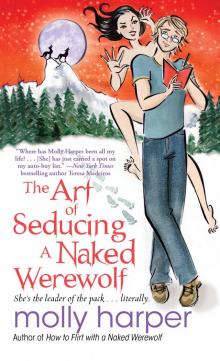 The Art of Seducing a Naked Werewolf
The Art of Seducing a Naked Werewolf Nice Girls Dont Have Fangs
Nice Girls Dont Have Fangs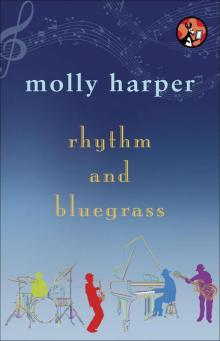 Rhythm and Bluegrass
Rhythm and Bluegrass Nice Girls Dont Bite Their Neighbors
Nice Girls Dont Bite Their Neighbors The Dangers of Dating a Rebound Vampire
The Dangers of Dating a Rebound Vampire Undead Sublet
Undead Sublet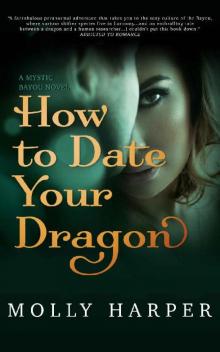 How to Date Your Dragon
How to Date Your Dragon Accidental Sire
Accidental Sire I'm Dreaming of an Undead Christmas
I'm Dreaming of an Undead Christmas Peace, Blood, and Understanding
Peace, Blood, and Understanding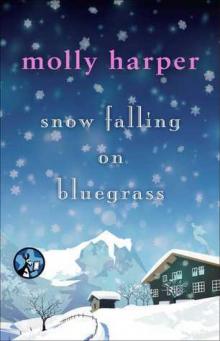 Snow Falling on Bluegrass
Snow Falling on Bluegrass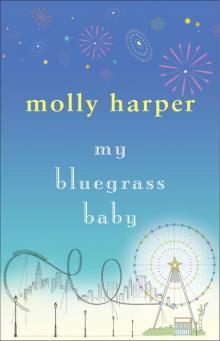 My Bluegrass Baby
My Bluegrass Baby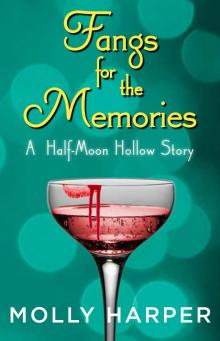 Fangs for the Memories
Fangs for the Memories Save a Truck, Ride a Redneck
Save a Truck, Ride a Redneck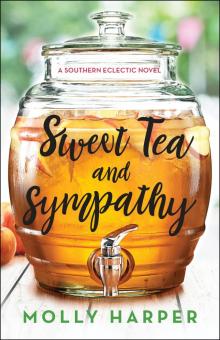 Sweet Tea and Sympathy
Sweet Tea and Sympathy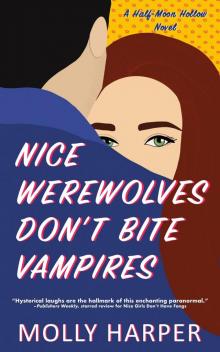 Nice Werewolves Don't Bite Vampires
Nice Werewolves Don't Bite Vampires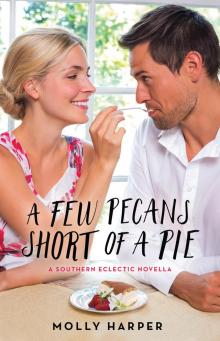 A Few Pecans Short of a Pie
A Few Pecans Short of a Pie And One Last Thing ...
And One Last Thing ... Big Vamp on Campus (Half-Moon Hollow Series Book 7)
Big Vamp on Campus (Half-Moon Hollow Series Book 7) Ain't She a Peach
Ain't She a Peach Love and Other Wild Things
Love and Other Wild Things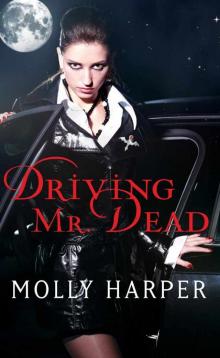 Driving Mr. Dead
Driving Mr. Dead![[Jane Jameson 03.5] Nice Girls Don't Sign A Lease Without A Wedding Ring Read online](http://i1.bookreadfree.com/i1/04/06/jane_jameson_03_5_nice_girls_dont_sign_a_lease_without_a_wedding_ring_preview.jpg) [Jane Jameson 03.5] Nice Girls Don't Sign A Lease Without A Wedding Ring
[Jane Jameson 03.5] Nice Girls Don't Sign A Lease Without A Wedding Ring Where the Wild Things Bite (Half-Moon Hollow #8)
Where the Wild Things Bite (Half-Moon Hollow #8) The Single Undead Moms Club (Half Moon Hollow series Book 4)
The Single Undead Moms Club (Half Moon Hollow series Book 4)